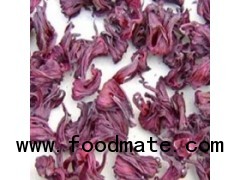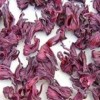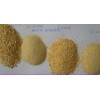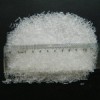The tea is popular as a natural diuretic; it contains vitamin C and minerals, and is used traditionally as a mild medicine.
Dieters or people with kidney problems often take it without adding sugar for its beneficial properties and as a natural diuretic.
A 2008 USDA study shows consuming hibiscus tea lowers blood pressure in a group of prehypertensive and mildly hypertensive adults. Three cups of tea daily resulted in an average drop of 8.1 points in their systolic blood pressure, compared to a 1.3 point drop in the volunteers who drank the placebo beverage. Study participants with higher blood pressure readings (129 or above) had a greater response to hibiscus tea: their systolic blood pressure went down by 13.2 points. These data support the idea that drinking hibiscus tea in an amount readily incorporated into the diet may play a role in controlling blood pressure, although more research is required.
Hibiscus rosa-sinensis has a number of medical uses in Chinese herbology.
In the Indian traditional system of medicine, Ayurveda, hibiscus, especially white hibiscus and red hibiscus (Hibiscus rosa-sinensis), is considered to have medicinal properties. The roots are used to make various concoctions believed to cure ailments such as cough, hair loss or hair greying. As a hair treatment, the flowers are boiled in oil along with other spices to make a medicated hair oil. The leaves and flowers are ground into a fine paste with a little water, and the resulting lathery paste is used as a shampoo plus conditioner.











